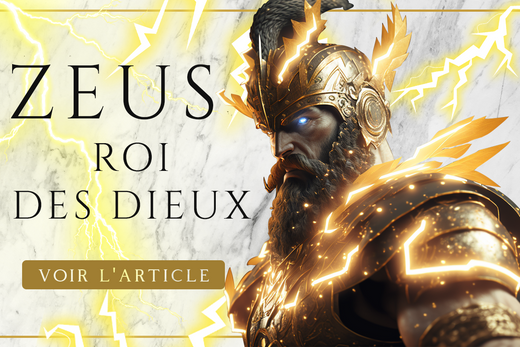
Zeus: King of the heavens and gods of Greek mythology
PARTAGER

The story of Zeus sovereign god of Olympus and the heavens of Greek mythology
In Greek mythology, he was the king and supreme god of Olympus. He was the son of Kronos and Rhea and one of the Twelve Olympians, the major gods of ancient Greece.
God of lightning and thunder, as well as justice and order. He was also the protector of guests and oaths.
When he was born, his mother, Rhea , hid the child and gave Kronos a rock wrapped in blankets instead. So Kronos devoured the rock, thinking that it was devouring his son. Zeus was raised in secret and grew up to become a powerful god.
WhenZeus became an adult, he challenged Cronus for the throne of Olympus. He used his power over lightning and thunder to defeat Kronos and take his place as king and supreme god of Olympus.
In general, the story between Cronus and Zeus is one of challenge and struggle for power. Zeus was eventually able to take the throne from Cronus and become the supreme god of Olympus.

The role of Zeus in Greek mythology
Zeus' role in Greek mythology was to rule over Olympus and protect mortals and gods. He was considered one of the most powerful and important gods in human history.

The incredible powers of Zeus from Greek mythology
Control of Lightning and Thunder: Zeus was the god of lightning and thunder and had the power to control these elements.
Control of the Elements: Zeus also had the power to control the natural elements, such as wind, rain and storm.
Transformation: Zeus had the ability to transform into different animals and take different human forms.
Time Control: Zeus had the power to control time and slow it down or speed it up.
Creation of life: Zeus also had the power to create life, as he did by creating the nine Muses with his mistress Mnemosyne .
Mind Control: Zeus had the power to control the minds of mortals and gods alike, as he did when he made his sister Hestia fall in love with him.
In general, Zeus was considered one of the most powerful gods in Greek mythology and had many superhuman powers.

The symbols of Zeus from Greek mythology
Lightning: Zeus was the god of lightning and thunder, and lightning was his main symbol.
The Thunderbolt: As he was the god of lightning, the thunderbolt was another common symbol of Zeus.
The Oak: The oak was a sacred tree to Zeus and was often associated with his power and wisdom.
The Bull: Zeus had the ability to transform into different animals, and the bull was one of his most common symbols.
The Throne: As the supreme god of Olympus, Zeus was often depicted seated on a throne, symbolizing his power and authority.
The eagle: Symbol of presence and power.
The Helmet: The helmet was another common symbol of Zeus, symbolizing his strength and determination.
In general, symbols of Zeus reflect his power, wisdom and ability to control natural elements.


The wives of Zeus from Greek mythology
In Greek mythology, Zeus had a lively love life and had many wives and mistresses.
His primary wife was Hera , goddess of fertility and birth, with whom he had many children, including Athena , god of wisdom and war, and Apollo , god of music and light. However, Zeus also had many other mistresses, often in secret.
One of his best-known mistresses was Mnemosyne, goddess of memory and poetic art, with whom he had the nine Muses. He also had an affair with Alcmene , a mortal woman, with whom he had Heracles , a demigod known for his heroic exploits.
Zeus also had many other mistresses and had many children with them. According to mythology, he was often jealous of his children and put them through many trials to prove their loyalty and bravery.
In general, Zeus was known for his lively love life and numerous relationships, which contributed to his reputation as a powerful and influential god in Greek mythology.

How did Zeus die?
In Greek mythology, Zeus did not die conventionally, as he was an immortal god. However, there have been many legends about its end, including:
Dethroned by his son: According to legend, Zeus would one day be dethroned by his son, Dionysus , god of wine and celebration.
Death by fire: In another legend, Zeus is killed by fire and replaced by his son, Hephaestus , god of fire and forging.
Death by the Titans: According to another legend, the Titans, mythical creatures from Greek mythology, once fought and killed Zeus.


